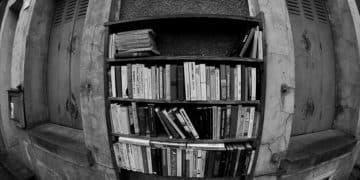Build a Reading List to Transform Your Writing in 6 Months

Building a reading list focused on diverse genres, writing styles, and critical analysis can significantly enhance your writing skills within six months by broadening your perspective, improving vocabulary, and refining your understanding of narrative techniques.
Looking to elevate your writing game? The secret might just lie in the books you choose to read. Discover how to build a reading list that will make you a better writer in 6 months, unlocking new levels of creativity and skill.
Why a Reading List is Essential for Writers
For writers, reading isn’t just a pastime; it’s a crucial part of the craft. A well-curated reading list can expose you to diverse writing styles, expand your vocabulary, and provide inspiration for your own work.
But how does one go about creating a reading list that actually delivers results? Let’s explore the key reasons why a reading list is essential for writers.
Exposure to Different Styles
One of the primary benefits of a reading list is the exposure it provides to various writing styles. By reading different authors, you’ll encounter diverse approaches to sentence structure, tone, and narrative voice. This exposure can help you develop your own unique style.
Vocabulary Expansion
Reading is a surefire way to expand your vocabulary. As you encounter new words in context, you’ll naturally absorb them. Over time, a richer vocabulary will enhance your ability to express yourself with precision and flair.
- Diverse Genres: Reading across genres exposes you to different vocabularies and writing conventions.
- Note-Taking: Keep a notebook to jot down new words and their definitions.
- Active Usage: Make an effort to incorporate new words into your writing.
Inspiration and Ideas
Reading can spark new ideas and provide inspiration for your own writing. Whether it’s a plot twist, a character archetype, or a thematic concept, engaging with literature can jumpstart your creative process.
In conclusion, a reading list is a powerful tool for writers. It offers exposure to different styles, expands vocabulary, and provides inspiration. By investing time in reading, you’re investing in your growth as a writer.

Setting Goals for Your Reading List
Creating a reading list without clear objectives is like embarking on a journey without a map. To maximize the benefits of your reading endeavor, it’s crucial to set specific, measurable, achievable, relevant, and time-bound (SMART) goals.
Let’s delve into how to set effective goals for your reading list.
Defining Your Objectives
Before diving into book selections, take a moment to define your objectives. What do you hope to achieve through your reading list? Are you aiming to improve your storytelling abilities, refine your prose, or broaden your understanding of a particular genre?
SMART Goal Setting
SMART goals provide a framework for setting clear and attainable objectives. A SMART goal is Specific, Measurable, Achievable, Relevant, and Time-bound. Applying this framework to your reading list can help you stay focused and track your progress.
Let’s break down each component:
- Specific: Instead of “read more,” aim for “read three novels from different genres.”
- Measurable: Track the number of books you read each month.
- Achievable: Set a realistic pace to avoid burnout.
- Relevant: Choose books that align with your writing goals.
- Time-bound: Commit to completing your reading list within six months.
Tracking Your Progress
Monitoring your progress is essential for staying motivated and making necessary adjustments. Keep a reading journal or use a tracking app to record the books you’ve read, your thoughts on them, and any insights you’ve gained.
In summary, setting goals for your reading list is crucial for maximizing its impact on your writing. By defining your objectives, applying the SMART framework, and tracking your progress, you’ll be well on your way to achieving your writing aspirations.
Choosing the Right Books
Selecting the right books for your reading list is paramount. The books you choose should align with your writing goals, challenge your perspectives, and offer valuable insights into the craft of writing.
Let’s explore how to choose books that will enhance your writing skills.
Diverse Genres
Reading across genres is a powerful way to broaden your understanding of storytelling techniques and narrative structures. Explore novels, short stories, memoirs, poetry, and even non-fiction works to expose yourself to a wide range of writing styles.
Classic vs. Contemporary
Balancing classic literature with contemporary works is essential. Classic novels offer timeless lessons on character development, plot construction, and thematic depth. Contemporary books provide insights into current trends and modern writing techniques.
Critical Analysis
Don’t just read passively; engage in critical analysis. Take notes on the author’s use of language, the structure of the plot, and the development of characters. Consider what makes the book effective and how you can apply those techniques to your own writing.
To conclude, choosing the right books is essential for a successful reading list. By exploring diverse genres, balancing classic with contemporary works, and engaging in critical analysis, you’ll gain valuable insights that will enhance your writing skills.
Creating a Balanced Reading Schedule
A well-structured reading schedule is essential for making consistent progress and avoiding burnout. Balancing your reading time with other commitments and incorporating strategies for maintaining focus are crucial for maximizing the benefits of your reading list.
Let’s explore how to create a balanced reading schedule that works for you.
Setting Aside Dedicated Time
Allocate specific time slots in your daily or weekly schedule for reading. Whether it’s 30 minutes in the morning, an hour in the evening, or a longer session on the weekends, consistency is key. Treat your reading time as a non-negotiable appointment.
Breaking Down Large Books
Tackling a lengthy novel can feel daunting. Break it down into manageable chunks by setting daily page goals. This approach makes the reading process less overwhelming and helps you maintain a steady pace.
Avoiding Burnout
Reading should be enjoyable, not a chore. To prevent burnout, vary your reading material, take breaks when needed, and don’t be afraid to abandon a book that doesn’t resonate with you. Remember, the goal is to enhance your writing skills, not to force yourself through uninspiring material.
In conclusion, creating a balanced reading schedule is essential for making consistent progress and avoiding burnout. By setting aside dedicated time, breaking down large books, and preventing burnout, you’ll be able to stick to your reading list and reap the rewards.

Analyzing What You Read
Reading is only half the battle; analyzing what you read is where the real growth happens. By actively engaging with the text, taking notes, and reflecting on the author’s techniques, you can extract valuable lessons that will enhance your writing skills.
Let’s explore how to analyze what you read and apply those insights to your own work.
Active Reading Techniques
Active reading involves more than passively absorbing words on a page. It requires engaging with the text, asking questions, and making connections to your own experiences and knowledge. Highlight key passages, annotate the margins, and write summaries of each chapter.
Note-Taking Strategies
Effective note-taking is crucial for capturing your thoughts and insights as you read. Develop a system for organizing your notes, whether it’s using a notebook, a digital document, or a note-taking app. Record quotes, observations, and reflections that resonate with you.
Applying Lessons Learned
The ultimate goal of analyzing what you read is to apply those lessons to your own writing. Identify the techniques and strategies that you found effective and experiment with incorporating them into your work. Practice emulating the styles of authors you admire, but ultimately develop your own unique voice.
In summary, analyzing what you read is crucial for extracting valuable lessons that will enhance your writing skills. By employing active reading techniques, implementing effective note-taking strategies, and applying lessons learned, you’ll be able to transform your reading experience into a powerful learning tool.
Staying Consistent and Motivated
Maintaining consistency and motivation is essential for achieving your reading goals. Life inevitably throws curveballs, and it’s easy to fall off track. However, with the right strategies and mindset, you can stay committed to your reading list and reap the rewards.
Let’s explore how to stay consistent and motivated throughout your reading journey.
Finding an Accountability Partner
Having an accountability partner can provide support and encouragement. Share your reading goals with a friend, family member, or fellow writer, and check in regularly to discuss your progress. Knowing that someone is counting on you can help you stay on track.
Rewarding Yourself
Celebrate your milestones and reward yourself for achieving your reading goals. Whether it’s treating yourself to a new book, a relaxing evening, or a special activity, positive reinforcement can help you stay motivated and make the reading process more enjoyable.
Adjusting Your Approach
If you find yourself struggling to stay consistent or motivated, don’t be afraid to adjust your approach. Re-evaluate your goals, switch up your reading material, or modify your schedule. The key is to find a system that works for you and adapt as needed.
In conclusion, staying consistent and motivated is crucial for achieving your reading goals. By finding an accountability partner, rewarding yourself, and adjusting your approach, you can stay committed to your reading list and unlock its transformative power.
| Key Concept | Brief Description |
|---|---|
| 📚 Diverse Reading | Explore various genres to enrich writing styles. |
| 🎯 SMART Goals | Set Specific, Measurable, Achievable, Relevant, Time-bound goals. |
| ✍️ Active Analysis | Engage with the text, take notes, and reflect on techniques. |
| 🗓️ Consistent Schedule | Allocate dedicated time for reading to avoid burnout. |
Retractable FAQ
▼
Exposure to various genres and styles broadens your vocabulary and understanding of narrative techniques, making your writing more versatile and engaging.
▼
A SMART goal is Specific, Measurable, Achievable, Relevant, and Time-bound, ensuring your objectives are clear and attainable within a set timeframe.
▼
Vary your reading material, take breaks when needed, and don’t force yourself through uninspiring books. Make reading an enjoyable part of enhancing your skills.
▼
Analysis allows you to extract valuable lessons on writing techniques and strategies, helping you apply them to your own work effectively.
▼
An accountability partner provides support and encouragement, helping you stay on track and committed to your reading goals through regular check-ins.
Conclusion
Embarking on a curated reading journey is a transformative step for any writer. By setting clear goals, selecting diverse and challenging books, and consistently analyzing what you read, you can unlock significant improvements in your writing skills within just six months. So, start crafting your reading list today and witness the evolution of your writing prowess.





